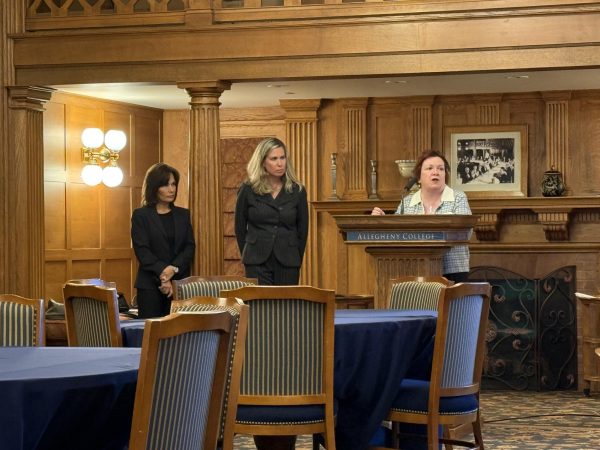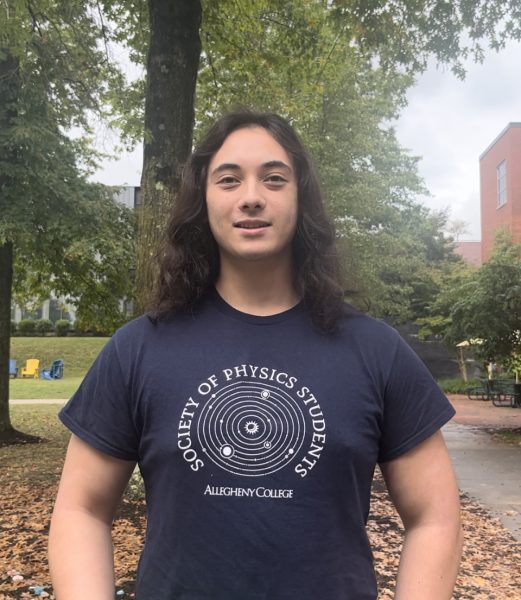College digitizes Ida Tarbell archival collection
Paula Treckel, professor emerita of history, delivered the 21st annual Pelletier Library Lecture, entitled “The World of Ida Tarbell” in the Collaboratory on Tuesday, Oct. 18.
Vice President for Information Services and Planning Richard Holmgren introduced Treckel prior to the lecture, noting her experience with Ida Tarbell, a member of the class of 1880. He said that Treckel inducted Tarbell into the National Women’s Hall of Fame, located in Seneca Falls, New York, in 2000.
Treckel said what drew her to Allegheny College before she began her position in 1981 was the Ida Tarbell Collection, located in the library’s Merrick Archives. She said her hiring committee asked why she wanted to work at Allegheny.
“My answer was immediate: You have the Ida Tarbell papers,” Treckel said.
While Tarbell donated a significant amount of her papers to Allegheny, Treckel said Tarbell’s notes from her research on Standard Oil are located in the Drake Well Museum in Titusville, Pennsylvania.
Research and Instruction Librarian Jane Westenfeld said the idea for a lecture on Tarbell came in May 2016. Westenfeld said she and former Library Director Linda Bills discussed whom to bring to campus to give the lecture.
“We had a talk about doing the Ida Tarbell lecture last year, and there was only one name that came up,” Westenfeld said. “Basically, it was a no-brainer.”
Westenfeld said the college received a $30,000 grant from the National Endowment for the Humanities to digitize the Tarbell Collection and to put the collection on the college’s online DSpace repository.
Treckel said she offered a junior seminar on Tarbell’s life, also called “The World of Ida Tarbell,” but that it was only offered once due to the fragile condition of the collection.
According to Treckel, the top five countries that access the digitized collection are the United States, Japan, France, the United Kingdom and China.
Tarbell attended Allegheny and was the only female member of her class, according to Treckel.
While Tarbell’s chief academic interest at Allegheny was biology, the methods she learned while at the college included finding information and digging out the truth.
“[These were] skills she later used to an astonishing effect as an investigative journalist,” Treckel said.
At the college, Tarbell was involved with The Campus. A staff box from the November 1877 issue of The Campus, available on DSpace, lists her as the only woman out of four total editors.
After graduating from Allegheny, Treckel said, Tarbell taught at a seminary in Poland, Ohio, where she discovered that she did not enjoy teaching. When the college offered her a teaching position two years later, she declined, instead taking a position with Chautauqua Magazine.
At the magazine, Tarbell’s original position was to annotate articles. After a short period, Treckel said, she began writing and translating other articles from French to English. Treckel said skills she learned writing for The Campus proved to be invaluable.
In 1890, Tarbell left the magazine and moved to France to write a biography of Madame Roland, according to Treckel.
“She reached for her independence and found it in France,” she said.
Treckel said Tarbell met Samuel S. McClure in 1892 and agreed to write for McClure’s Magazine when she returned to the U.S. When she returned from France, Tarbell wrote an authoritative biography of Abraham Lincoln.
“She sought to portray … Lincoln the man,” Treckel said.
Tarbell’s next major work was on the notorious Standard Oil trust. According to Treckel, Tarbell spent one year researching the project, canvassing small local courts to find records of wrongdoings.
Treckel said the trust controlled 90 percent of U.S. oil by 1891 and owner John D. Rockefeller did not shy away from coercing smaller oil refineries into selling their companies.
“If they didn’t submit, he destroyed them,” Treckel said.
While Tarbell’s upbringing in an oil city that had its economy crushed by the trust exposed her to the devastating effects of Standard Oil, Treckel said her writing on the trust was objective.
“Hers was not an exposé driven by anger or revenge,” Treckel said.
Tarbell originally intended for her story on Standard Oil to be done in three installments, Treckel said, but it soon became 19 installments published over a period of two years. The U.S. government took action in 1906 based in part on Tarbell’s writings, charging Standard Oil with violating the Sherman Anti-Trust Act.
Treckel said Tarbell met and corresponded with many public and political figures during and after her time at McClure’s, including fascist Italian leader Benito Mussolini and Alexander Graham Bell.
Westenfeld said Tarbell’s connections were representative of her importance.
“She was a powerhouse,” Westenfeld said. “I mean, the people that this woman knew.”
While Tarbell was a prominent American woman who molded public political opinions, Treckel said a major contradiction was her opposition to women’s suffrage.
“The woman who sought to ‘make a man of herself,’ she said, was doomed to failure,” Treckel said.
An unpublished manuscript of Tarbell’s entitled “Women’s Suffrage As I See It,” available on the college’s DSpace repository, lays out her view on suffrage.
“I do not believe myself, that they are going to do with it the things that they think,” Tarbell wrote. “I believe that it will hamper them in ways they do not see.”
Tarbell also wrote in the same manuscript that women’s suffrage can have a “slow, questionable and discouraging” educational effect.
Treckel said this was the most confusing part about Tarbell she had discovered in her research.
“I can’t make sense of it,” Treckel said.
Westenfeld said a goal of the lecture was, in part, to celebrate the digitization of the college’s collection. She said the college began with scanning letters and eventually digitized 17,000 titles, comprised of at least 17,500 PDF files.
A successful digitization effort, according to Westenfeld, is the ability of researchers to access such a broad collection.
“People have a way of getting to it,” Westenfeld said.





